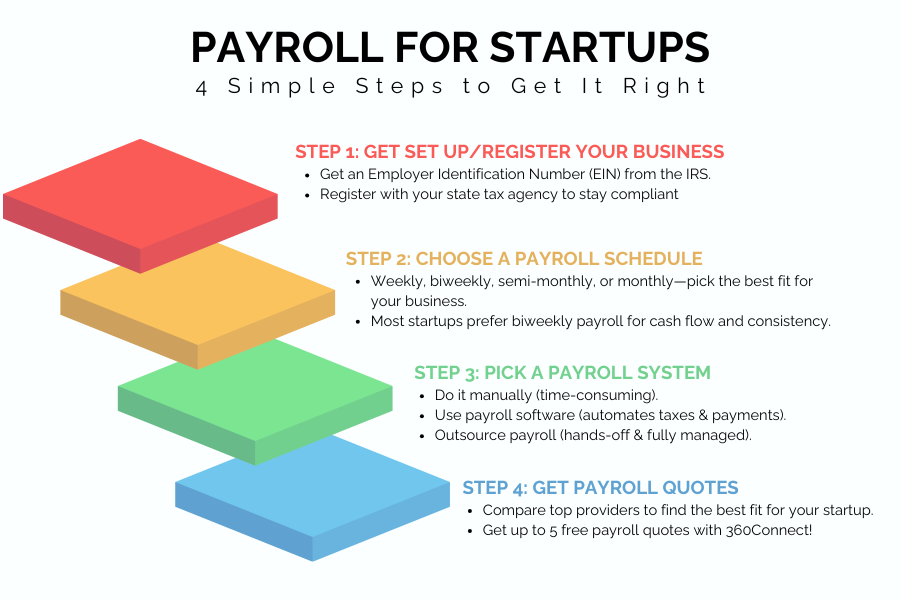Getting Started: Welcome to Payroll for Startups
So, you did it, you started a business, hired employees, and now you’re staring at the payroll process like it’s a foreign language. We get it. You didn’t launch your startup to spend hours calculating tax withholdings and direct deposit schedules. But here’s the reality: payroll is a must, and if you don’t do it right, your dream company could face penalties, unhappy employees, and unnecessary headaches.
The good news? You don’t need to become an overnight payroll expert. You just need a clear game plan and the right tools. This guide will walk you through the payroll essentials for startups, minus the jargon and confusion.
Payroll 101: What Is Payroll for Startups and Why Does It Matter?
If you’re running a startup, payroll isn’t just another administrative task; it’s the backbone of keeping your employees happy, your business compliant, and your operations running smoothly. So, what exactly is payroll?
Payroll refers to the process of compensating your employees for their work. It involves calculating wages, withholding taxes, making direct deposits, and ensuring everything complies with state and federal laws. As a startup, getting payroll right from the beginning is crucial because mistakes can lead to fines, legal trouble, and unhappy employees, none of which you want when you’re trying to scale your business.
Here’s what you need to get started:
- Employer Identification Number (EIN): Before you do anything, you need an EIN, which is essentially your business’s tax ID. This is required for reporting payroll taxes and other tax-related documents. You can apply for one online through the IRS, and it’s free.
- Register with State Tax Agencies: In addition to federal taxes, you need to register with your state’s tax agency to pay unemployment and other state-specific payroll taxes. Each state has different requirements, so don’t skip this step.
- Understand Employee Classification: This is a big one for startups. Are your workers employees (W-2) or independent contractors (1099)? Misclassifying workers can lead to massive tax penalties, so be sure you know the difference.
- Set Up a Payroll Schedule: Decide how often you’ll pay employees, weekly, biweekly, or monthly. Many startups opt for biweekly because it balances cash flow and keeps employees satisfied.
- According to a 2023 survey, biweekly payroll is the most common in the U.S.
- Related: 3 Key Differences Between Semi-Monthly vs Bi-Weekly Payroll
- Withhold Payroll Taxes: This includes federal and state income taxes, Social Security, Medicare, and unemployment taxes. These need to be paid on time to avoid penalties.
- Choose a Payroll System: Payroll for startups can be done manually, using software, or outsourcing altogether.
Which Payroll Option Is Right for Your Startup?
Payroll for startups doesn’t have to be painful. As a startup, you need a system that’s efficient, scalable, and cost-effective. Here are your three main options:
- DIY Payroll: Doing payroll yourself might sound budget-friendly, but it requires serious attention to detail. You’ll be responsible for calculating wages, tracking hours, withholding taxes, and filing payroll reports with the IRS. This is feasible for a startup with just a few employees, but as you grow, managing payroll manually can quickly become overwhelming.
- Over half of organizations (51%) still use spreadsheets and manual processes (19%) for payroll.
- Payroll Software: Most startups opt for payroll software because it automates tax calculations, deductions, and payroll processing. Software like Gusto, QuickBooks Payroll, and more help ensure compliance while saving you time. However, you’ll still need to input data and oversee the process.
- Outsourced Payroll Services: If you want to completely remove payroll from your to-do list, outsourcing is the best option. Payroll providers handle everything from tax compliance to direct deposits, but this comes at a higher cost. If you’re scaling quickly or managing remote teams, outsourcing may be worth it.
- Related: In-House vs. Outsourced Payroll
Payroll Software vs. Payroll Services: What’s Best for Startups?
Payroll for startups can be managed through payroll software or payroll services, but they cater to different needs. Here’s how they differ:
Payroll Software: Payroll software automates many aspects of payroll processing, from calculating wages and deductions to generating tax forms. It’s a good choice for startups that want a cost-effective, user-friendly solution while maintaining control over payroll. Most software integrates with accounting tools, making financial tracking easier.
Payroll Services: Payroll service providers take full control of payroll processing, handling tax payments, compliance, direct deposits, and reporting. While more expensive, outsourcing payroll can be a stress-free option for startups that want to focus on scaling without dealing with payroll complexities.

How Much Does Payroll Cost for Startups?
So, let’s get to what you’re really wondering: how much does payroll actually cost?
The cost of payroll varies depending on whether you handle it manually, use payroll software, or outsource it to a service provider. On average:
- Manual payroll costs mostly your time but can lead to costly mistakes.
- Payroll Service typically ranges from $20 to $120 per month, plus $1 to $10 per employee.
Other costs to consider include payroll taxes, compliance fees, payroll software, and potential penalties for late filings. Planning ahead ensures you keep payroll costs manageable while staying compliant.
Common Payroll Mistakes Startups Make (And How to Avoid Them)
Payroll mistakes can cost your startup time, money, and legal trouble. Here are some of the most common pitfalls:
- Misclassifying Employees: Confusing contractors with employees can lead to IRS penalties.
- Missing Payroll Deadlines: Late paychecks damage employee trust and can result in fines.
- Failing to Withhold Taxes: If you don’t properly deduct payroll taxes, your business could face penalties.
- Not Keeping Accurate Records: Payroll records must be stored for at least three years to comply with federal regulations.
- Ignoring Compliance Updates: Payroll laws change frequently; staying informed prevents costly mistakes.
Avoiding these mistakes can keep your startup running smoothly and your employees happy.
Top Payroll Options for Startups
Now that you have a solid understanding of how much payroll costs and the common mistakes to avoid, the next step is choosing the right payroll solution.
As a startup, you need a payroll system that keeps things simple, automates key tasks, and ensures compliance, without draining your budget. Whether you’re looking for a budget-friendly payroll software, a full-service provider, or something in between, there’s an option that fits your needs.
Let’s take a look at the top payroll options for startups and what makes each one stand out.
Gusto
Gusto is one of the most popular payroll options for startups because it’s user-friendly and designed with small businesses in mind. It automates tax filings, direct deposits, and even offers HR tools like benefits administration.
- Best for startups looking for an easy-to-use payroll system.
- Great for businesses that need built-in HR tools along with payroll.
BambooHR
BambooHR combines HR management and payroll services into a single platform, making it ideal for startups that want an all-in-one solution. It offers automated tax filings, direct deposits, and time tracking, along with tools to manage onboarding, benefits, and employee data.
- Best for: Startups looking for payroll and HR tools in one platform.
- Great for: Businesses that need time tracking and compliance support.
ADP
ADP is a scalable payroll solution that works well for startups expecting rapid growth. It offers strong compliance support, automated payroll processing, and HR tools for managing employee benefits and performance.
- Best for startups that plan to scale quickly.
- Great for businesses needing compliance and HR support.
Paychex
Paychex provides comprehensive payroll and HR solutions tailored for startups and small businesses. It offers hands-on customer support, tax filing services, and employee benefits management.
- Best for startups needing hands-on customer support.
- Ideal for businesses looking for an all-in-one payroll and HR solution.
Final Thoughts: Get Payroll Right from the Start
As a startup, payroll might not be the most exciting part of running your business, but getting it right from the start will save you headaches later. Whether you choose payroll software or an outsourced service, making the right decision will keep your employees happy, your business compliant, and your growth on track.
Get the Payroll Solutions You Need
With 360Connect, you can get up to five free quotes from reputable payroll suppliers in minutes. Compare options, find the best fit for your startup, and focus on scaling your business with confidence.

